Pauline Murray - Interview
by Andrew Twambley
published: 29 / 10 / 2020
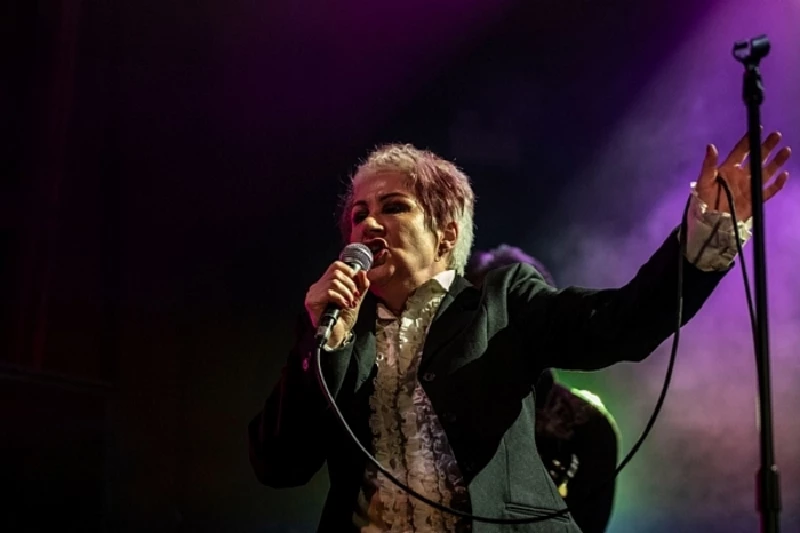
intro
Penetration vocalist Pauline Murray speaks to Andrew Twambley about her new solo album 'Elemental' and her 70's punk background.
Whenever you see a film or a TV show about the punk explosion of 1976/77, the commentators generally concentrate on bands such as the Sex Pistols and the Clash, often overlooking the important fact that there were a significant number of truly great bands only a whisper behind. One such band was Penetration with its iconic frontwoman, Pauline Murray. Penetration were not from East London or the Westway. They were not even from Manchester or Liverpool…they took on the punk scene from the unlikeliest of hometowns, Durham. By their second gig they were supporting the Stranglers at Newcastle City Hall and a short time later were showing the Southerners how to do it at The Roxy in Covent Garden, appearing on the bill with Generation X. Pauline Murray was never one to stay still and became Pauline Murray and the Invisible Girls in 1980 under the auspices of Manchester royalty, Martin Hannett. Since then she has reformed Penetration and is now making her name as a recognised solo artist. She will be releasing the brilliant album ‘Elemental’ in October. We caught up with her as lockdown was easing. PB: Hi Pauline, thanks for taking the time to speak to us today. Tell me about ‘Elemental’. Why now and what inspired you to put this work together? PM: Well, it’s been quite a while in the making. We started it about four years ago in October 2016. I started to do acoustics gigs, and I had about half a dozen songs written that I’d only done for the acoustic gigs. I’d never recorded them or anything and we went to France for a month. My sister had a house there at the time, and Rob (Blamire, Penetration and Invisible Girls bassist and Pauline’s partner), and I took our musical gear with us and we started it then. We spent a month casually having a nice time, and we got the basics of maybe half a dozen of the tracks down just on acoustic guitar with electronics. We came back with whatever we had done there and then we had to go and do other things. I did stuff like supporting the Psychedelic Furs and then we did Penetration stuff. So, we didn’t get round to finishing it at the time and then we came back to it a bit later on. We have our own studio in Newcastle, and Rob said he thought we should get other people to come and play on it. Hence we asked Paul Thompson.. PB: The “Great Paul Thompson”? PM: Yes, the drummer from Roxy Music who I loved as a teenager, and he said he would drum on some of the tracks. We have rehearsal studios in Newcastle, and he was drumming with Lindisfarne and they were coming into rehearse, and Rob, who’s also a great Roxy music fan, said, “I’m going to see if Paul Thompson will do some drums,” and he plucked up the courage and said to him , “Would you come and do some drumming?” . He said, “Yeah,” so we were absolutely delighted. It was such a buzz because he’s such a great drummer, and he is in the room drumming on one of our tracks, and he’s a really nice guy as well. Some of the album tracks have electric drums on still and some have him on. We asked Steve Hopkins from the Invisible Girls to come and play some piano stuff, and then it became something else. We got it finished eventually to the point that we were happy with it and then we had to try and get it out. We just didn’t know where to turn with it, and then we met a friend of mine who knew someone who was a manager. We got involved with him, and we managed to turn it all around and get it out. Then we didn’t have a sleeve and we asked a few different people to have a go at the sleeve. By the end of February I was like, “Right I’ve got to do something here…”. I changed the title and did the painting for the sleeve, so now we are absolutely delighted to just get it out there. PB: I remember when I first heard ‘Secrets’, the first single from it, in late June. It’s fresh and very classy, much more of an Invisible Girls sound than Penetration and has the depth and emotional content of ‘Drummer Boy’. What was the thinking behind that particular track? PM: We recorded it in the mid-1980s, and all we had was a cassette with that track on it, and with this album I have taken a few songs from the past that we never had done anything with them. If we didn’t do anything with them at this point, we never would. We found that cassette, and it was really good because it had that freshness about it, and we decided to re-record it. It was really difficult as we wanted to do it exactly the same as this particular version on the cassette had a really good feel to it. It’s always a little bit difficult to do it again and retain the vibe. We more or less replicated the sounds from that, and I think it went really well. We were really pleased with how it translated across and kept all the same elements. As the song was written in the mid-‘80s, we re-did it with that ‘80s vibe. PB: To me, it sounds modern. Lyrically it’s about the pressure to conform which is as relevant today as it was back in the 1980s, maybe more so. PH: It’s about what people are thinking, and how we perceive things, and how people can tell lies and you can’t always tell that they are telling them. It’s about perception and it’s really relevant to today. I do believe, eventually, that secrets do come out. PB: The sections of the video for it with the Volvo are from the old days, I believe ? PM: Yes, the old Volvo was ours from the mid-‘80s. We just found the footage. It was our Volvo, and we did a bit of filming of it, and we thought we might be able to use it one day. Our friend had had it and he had been broken into, so we thought we’d lost it. Then earlier this year his brother was putting some VHS onto a digital, and he found the footage and some other footage of us. Rob wanted to put it in there, so it’s original footage which was filmed in the mid-‘80s as well so it really fits in the video… PB: It does… PM: We had to do the video ourselves as it was done in the very early part of the lockdown. We just had this idea to set up a camera in the attic and did it in the dark, and mixed the colours beforehand, just me with a mirror with a light around the edge. I just set the camera going and started to do the painting and then it worked out really well. We are lucky it turned out like that. It was all done in one take, I started doing it on my own up there, and Rob came up part of the way through as the camera had ran out of battery. He changed the battery in the camera, so there is a little bit of the process missing. PB: No one’s ever going to be able to notice that. PM: I just carried on painting. Once I started I just had to keep going. PB: With many artists who have been performing for a good few years, their voice tends to lose its clarity and quality. On the new album, yours is still as distinctive and crystal clear as ever. How do you manage that? Do you gargle? PM: Ha, ha. No, I don’t do anything at all. PB: Nothing? PM: Nothing at all. My voice sounds quite young when I hear it. God knows how can it sound so young! PB: And crystal clear. PM: I’m really blessed in a way because I can sing and it’s still there. You have to have faith that you can do it. PB: You apparently did the track ‘Dark Cloud’ from the new album as a live take… PM: That’s the only track we did as a live take. Steve Hopkins was coming up from Manchester to do sessions and he said, “You’re going to do at least one of the tracks as a live take.” I wish we’d filmed it as it was such a thrill for me being a Roxy Music fan. It was Paul Thompson on the drums, Rob on the bass and me playing acoustic guitar and singing and Steve Hopkins on the keyboard, and I just thought, “Wow! I can’t believe this. I’m sat playing on one of my songs with these brilliant people.” So that track was the only one done as a live take, and we kept it really simple. PB: I know it’s difficult to plan at the moment but do you intend to take ‘Elemental’ on the road next year? PM: Yesh, we’ve been offered the chance to do support for Psychedelic Furs in April/May. We’ve got six dates for that, so we will be doing songs from ‘Elemental’ and the Invisible Girls, I don’t think Steve Hopkins is able to do it, but we will be doing it. PB: Are we going to see you sitting on a chair with a guitar and one spotlight on you? PM: Well, usually when I do my acoustic set that’s what I do. I sit on a chair and play the acoustic and sing. Again I had not done that until a few years ago when I decided to try and get out of my own comfort zone. The singer-songwriter Martin Stephenson asked me to do this thing at a local venue, this acoustic thing, and I thought, “I don’t know about that, Martin,” and then someone was bringing posters round and my name was on it and I thought, “Shit, I’ve got to do this now.” So, I started off doing these songs, one of them was Kylie Minogue’s ‘Can’t Get You Out Of My Head’ and I was terrified, absolutely terrified, shaking and all that,and I thought, “I’ve got to keep doing this because it’s out of my comfort zone and it’s another skill." So I’ve done quite a few of them now. They are very intimate and very different to Penetration or the Invisible Girls, but I do quite like doing those as well. PB: I hear you are spending a great deal of time at Polestar, your own studios. What’s going on there and what plans do you have? PM: We’ve just reopened. We closed down on 23rd March like everyone else. It was quite busy, but I could just sense that something was coming and I kept an eye on it, and, sure enough, bands just started to cancel one after the other in that one week, and then the Government issued their thing so we knew we had to close. So, literally on the Sunday evening we just locked up and left. We didn’t reopen until 27th July. We pulled it all apart and painted and decorated it all about three weeks before, so it was spotlessly clean and we had to change some of the rules and how we were operating and stuff. A lot of people are still very wary about everything. The committed bands are, however. back and it’s picking up again, so it’s all good as long as we don’t go into lockdown again. PB: We can’t do that or the whole country would just collapse. PM: Well, if that happens, I think it’s game over. I don’t think people will be able to come back from it. We’ve managed to come back so far, but if it all drops off I don’t know what’s going to happen. PB: If I may take you back in time, you were there right at the beginning of punk in ‘76/’77. What can you remember about that period? PM: It was really exciting because we were eighteen/nineteen year olds and thought we’d change the world and felt like we were on some sort of mission. Punk at the time was really different and really groundbreaking. I mean looking back at it I just don’t know how we did it, God! We had no money. We had nothing but we did it! PB: You were miles away from London, Manchester or Liverpool. PM: We used to go to Liverpool and Manchester and support The Fall and we went to Scotland and Sheffield as well, so we did go out and about quite a lot. PB: I remember seeing you in Eric’s in Liverpool. PM: Yeah, when they did the matinee shows. PB: Yes, and evening shows afterwards. Those were the days. That shows my age. PM: Well, yeah (Laughs). We’re all getting on a bit but it doesn’t mean you have to throw the towel in. PB: Definitely not. So, after two and a bit years at the forefront of punk, you went to Manchester and started working with the Manchester Royal Family, and the likes of Martin Hannett, John Cooper Clarke, Buzzcocks and Bernard Sumner. How did you manage to get in with all those guys? PM: We did a hell of a lot of work with Penetration, We just never stopped and we went through all the levels pretty quickly in three years, from like nothing, from small clubs and then through the university circuit and then into the City Hall circuit really, whilst recording, and I reached a point - I think we all did- when we felt really burnt out. It was such an effort to keep everything moving on. I think we were ready for a break to be honest. Maybe if we’d had a break it might have been a different story, but anyway we were a bit sick of it all and there was only me and Rob that stayed together and we started writing together. The band split in December 1979, and we just started writing together straight away and we had all the songs. We had a manager still at that point, and RSO Records were interested in signing us. Martin had done Jilted John, so we knew him. I didn’t want to put another band together, and we knew that he had a sort of house band from the Jilted John and John Cooper Clarke stuff. I just rang him to see if he’d be interested and we sent our full track versions across and he said yes. We did ‘Dream Sequence’ first in the early 1980s, and Carl Burns originally drummed on that. Martin was such a stickler for timekeeping that he felt like it slowed down in the middle section and he wasn’t happy about that, so we went down to London and we got a session guy in, Trevor White or something, and he was just amazing. The guy put the track back in time on two takes. So, we did ‘Dream Sequence’ first, and later that year we went and did the ‘Pauline Murray and the Invisible Girls’ album in Strawberry Studios. It was a bit daunting, I must say. PB: You actually lived at Martin Hannett’s house. He is credited with designing the sound of Manchester and being an exacting task master. What was that experience like? PM: It was while we did the album we stayed there. I got very depressed, and I had to go home. He was quite eccentric! He was older than us and we’d done a hell of a lot, but he made me feel like I knew nothing. I lost my confidence basically because I was out of control with what was happening. He was very much in control of the situation. I reached a point after a week or two where I got really depressed and I couldn’t speak to anybody and I had to go home for a week and then had to go back there, so it was quite traumatic for me. It was a great result though. I was thrilled to work with Martin Hannett and live with him. I really liked the guy and he was brilliant. He loved his gadgets and he had a very strange take on it all, but when you are in it and it’s your album it’s quite hard to take. When you’ve spent maybe three hours with a guitar lead and tapping it on something and you think, “Shit, he’s made me do that for three hours”, you do ask yourself what the hell for. You just didn’t know what was going on, but , hey, I’m absolutely thrilled to have made an album with Martin Hannett. PB: Personally I think the ‘Pauline Murray and the Invisible Girls’ album is one of the greatest, undiscovered albums of all time. It was way ahead of its time. PM: I think it was ahead of its time, I think it was the precursor to the ‘80s. I really do. PB: What was your vision then? What were you trying to create at that point? PM: We had songs, but they were just songs to us. Martin Hannett created the sound but with our songs and we had the thing where we didn’t want a band, so it was like a precursor to the producer albums of the ‘80s and ‘90s. We were moving away from punk, so I do think it was the right way to go at the time. PB: I often watch music documentaries with a tendency toward the punk era. I see the same footage and the same commentators and the same bands, but rarely Penetration. I never see Pauline Murray. It’s as if you have been written out of history or have you deliberately avoided such nostalgia? PM: No, I just think we have been very overlooked. I don’t know whether it was because we are true North. We’re not part of the Manchester scene. We are Newcastle in the North East which is true North. People thought that we didn’t know anything. I think there is that and I am also female. I’m massively outnumbered by men, and I don’t know whether that’s got anything to do with it as well. PB: A lot of the greatest artists from that era are females, if you think about it. Most are still there today, so you’re in a great club there. PM: It’s not been easy just to keep things going. I don’t think feel I’m particularly male or female but I do think the band has been overlooked because we were very isolated as we were not a part of the Manchester scene or the London scene. We weren’t always around getting the right photo opportunities, hanging out with all the right people. We never really got the airplay, and we never had a hit. Even though something like ‘Don’t Dictate’ sold a lot of records at the time, we just didn’t get into the charts and I don’t know whether that was because of our name - Penetration. PB: I never thought about that. Sex Pistols got in the charts and Buzzcocks. PM: They did, but they didn’t want them there. PB: You’re not kidding. PM: I do think we have been quite overlooked in a way, but then again a lot of people know about the band. PB: I recently read a piece where you named your ten favourite albums of all time, but noticeably the most recent album on that list is ‘Rust Never Sleeps’ by Neil Young which came out 1979. Was that the year music died for you? PM: It’s certainly the year where the wave crashed. I think the business took a whole load of it all and moulded it all and signed everyone up and worked them as much as they could, exploited everyone and then dumped them if they weren’t selling enough. I don’t think the artist was ever considered in any of it. PB: If you were eighteen again now, would you form Penetration or would you be into grime? PM: I have no regrets with anything that I’ve done, I’ve seen so many things and met so many great people. I have had a great career which I probably wouldn’t have done if I hadn’t started Penetration. I would have had a totally different life. I wouldn’t have my studio. So, I don’t regret any of it. Do you mean if I was eighteen now though? Probably not, I don’t know. Young people of today are not really into guitar music. It’s all technology really. PB: There is a lot of dead music about today. PM: Well, it’s about machines in the music rather than people making it…soulless. PB: Thank you. 'Elemental' will be released on Polestar Records on 25th September 2020. Photos by Andrew Twambley www.twambley.com
Band Links:-
https://en.wikipedia.org/wiki/Pauline_Murrayhttps://twitter.com/paulinemurray
https://www.facebook.com/Penetration
Play in YouTube:-
Have a Listen:-
Picture Gallery:-
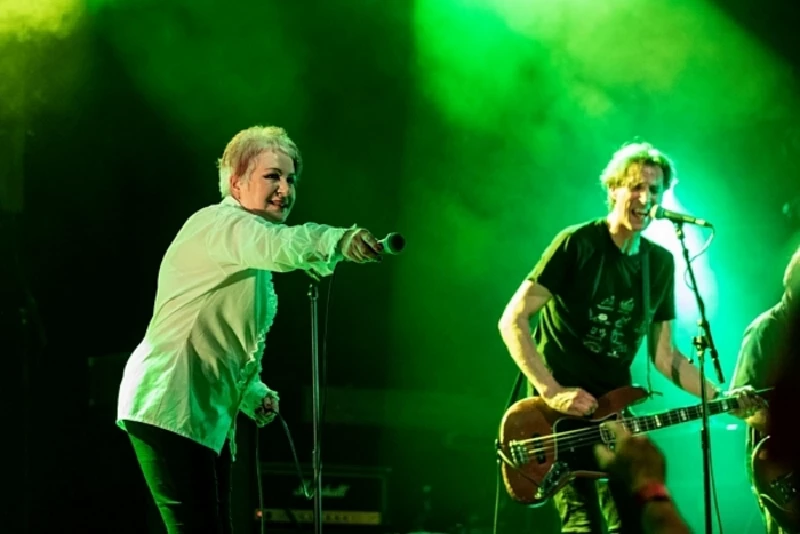
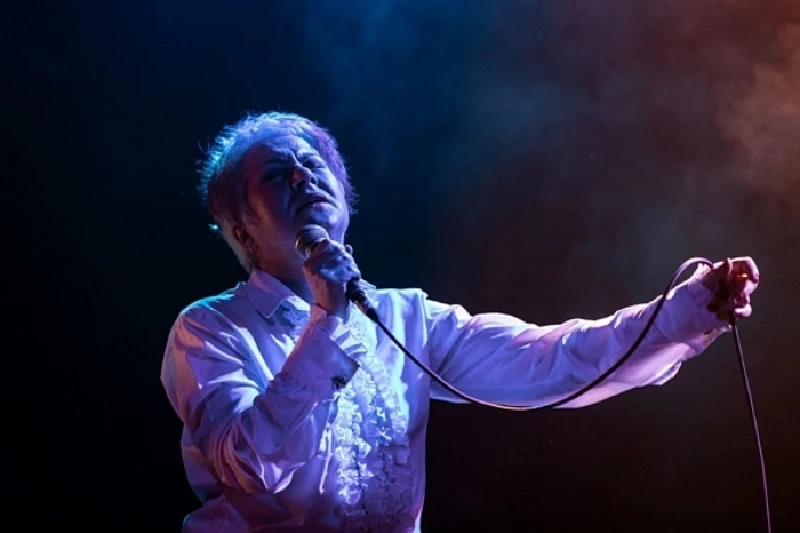
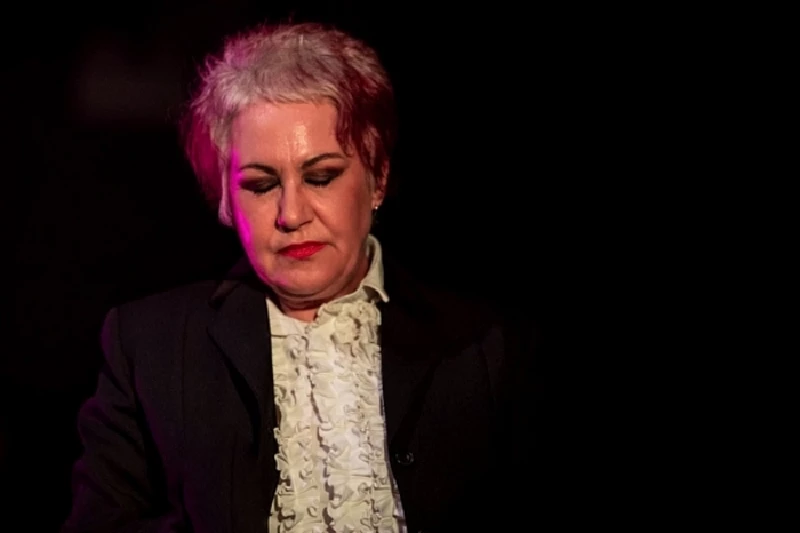
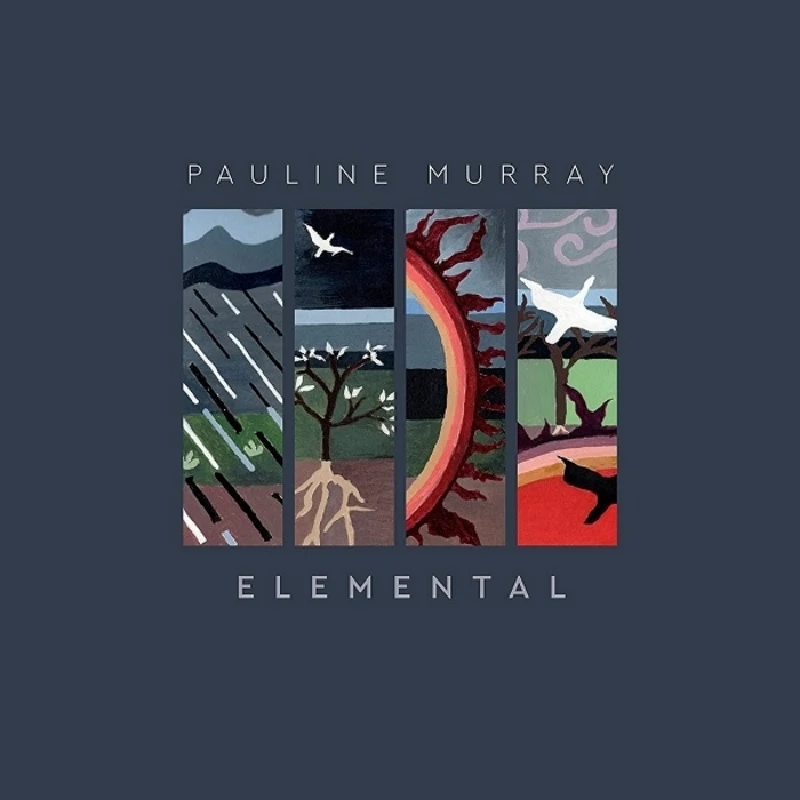
photography |
|
Photoscapes (2022) |
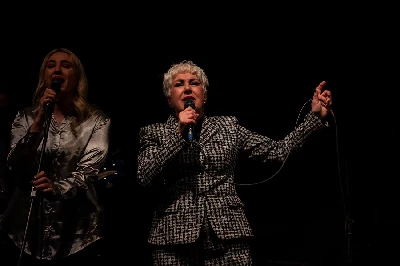
|
| Andrew Twambley takes photographs of Penetration vocalist Pauline Murray with her side project The Invisible Girls at the Academy 2 in Manchester. |
most viewed articles
current edition
Carl Ewens - David Bowie 1964 to 1982 On Track: Every Album, Every SongArmory Show - Interview with Richard Jobson
Colin Blunstone - Thalia Hall, Chicago, 16/7/2025
John McKay - Interview
Visor Fest - Valencia, Spain, 26/9/2025...27/9/2025
Bathers - Photoscapes 1
Billie Eilish - O2 Arena, London, 10/7/2025
Loft - Interview
Robert Forster - Interview
Sir Tim Rice - Interview
previous editions
Manic Street Preachers - (Gig of a Lifetime) Millennium Stadium, Cardiff, December 1999Heavenly - P.U.N.K. Girl EP
Beautiful South - Ten Songs That Made Me Love...
Oasis - Oasis, Earl's Court, London, 1995
Prolapse - Interview
Boomtown Rats - Ten Songs That Made Me Love....
Trudie Myerscough-Harris - Interview
Peter Perrett - In Dreams Begin Responsibilities Interview Part One
Pixies - Ten Songs That Made Me Love...
Coldplay - Wembley Arena. London, 16/8/2022
most viewed reviews
current edition
Davey Woodward - Mumbo in the JumboAmy Macdonald - Is This What You've Been Waiting For?
Sick Man of Europe - The Sick Man of Europe
Phew, Erika Kobayashi,, Dieter Moebius - Radium Girls
Lucy Spraggan - Other Sides of the Moon
Bush - I Beat Loneliness
Suzanne Vega - Flying With Angels
Alice Cooper - The Revenge of Alice Cooper
Blueboy - 2
Cynthia Erivo - I Forgive You
Pennyblackmusic Regular Contributors
Adrian Janes
Amanda J. Window
Andrew Twambley
Anthony Dhanendran
Benjamin Howarth
Cila Warncke
Daniel Cressey
Darren Aston
Dastardly
Dave Goodwin
Denzil Watson
Dominic B. Simpson
Eoghan Lyng
Fiona Hutchings
Harry Sherriff
Helen Tipping
Jamie Rowland
John Clarkson
Julie Cruickshank
Kimberly Bright
Lisa Torem
Maarten Schiethart